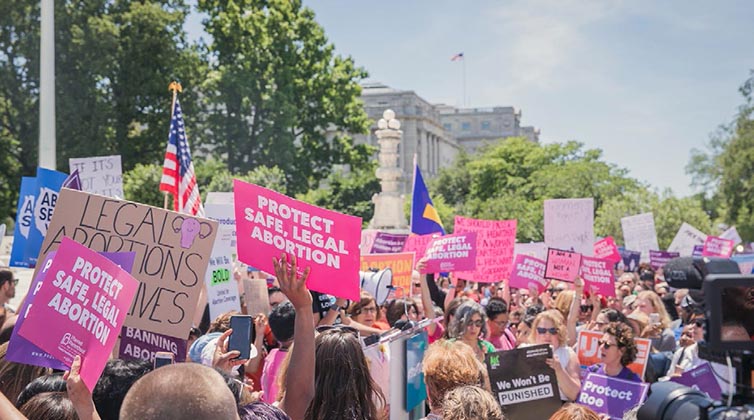Efforts at reproductive governance that monitor and control women’s reproductive behaviors were central to Trump’s policies, buttressed by anti-abortion rhetoric designed to appease his base, especially evangelicals. The attacks on reproductive justice shared political and ideological foundations with parallel attacks on immigrants. Trump pushed an unprecedented agenda of legal violence by framing immigration as a threat to national security, the economy, and the identity of the United States and by promulgating policies and discourse that restricted immigration of the “undeserving.”
Reproductive and immigration policies were linked by the fact that women of color were the principal targets of both. The massive numbers of deaths that resulted from Trump’s mismanagement of the COVID-19 pandemic fit the same pattern. People of color and immigrants, who had no choice but to work in risky frontline jobs and reside in crowded housing, were disproportionately victims of the failure to control the pandemic.
A key element of the attack on reproductive justice was the effort to nullify the Affordable Care Act (ACA), which had expanded women’s access to reproductive health services through preventative care that included contraception, cancer screening, and prenatal care. While Trump did not succeed in nullifying the Affordable Care Act, many of his efforts to impede women’s right to reproductive health care were successful. His administration’s successes included defunding Title X, which provides health services to 43 million low-income women in the US and abroad, directing funding for teen pregnancy prevention to programs that use ineffective abstinence-only instruction, allowing health care practitioners to discriminate against LGBTQ patients, and appointing almost 200 lower-court judges and three Supreme Court justices who will put women’s access to abortion in jeopardy.
The administration’s parallel efforts to attack immigrants of color also achieved alarming success. Trump’s unprecedented restrictive agenda on immigration demonized Latinos and included over 400 policy changes: it banned travel for people from predominantly Muslim nations, reduced refugee admissions to the lowest since 1980, ended Temporary Protected Status for 400,000 immigrants from ten countries, made qualifying for legal permanent residence or citizenship more difficult, prevented migrants from filing asylum applications unless entering at an official border crossing, removed violence (domestic and gang) as the basis for asylum, “metered” asylum petitioners by forcing them to remain in Mexico until called, and expanded regulations that limited immigrants’ ability to qualify for benefits such as food stamps. Under a “zero-tolerance” policy, Trump’s administration separated thousands of children from their parents, allowed detention conditions that led to neglect, abuse, and deaths, especially for minors and trans migrants, and deported migrants, which exposed them to COVID-19 and other life-threatening risks. Immigrant women were subject to forced sterilizations and bureaucratic practices that criminalized abortion while in detention.
For low-income women, and women of color in particular, the combination of anti–reproductive justice and anti-immigrant policies had devastating effects. These policies have empowered states hostile toward abortion rights, where six in ten US women live. Increasing maternal mortality rates for Black and indigenous women were a particularly disturbing metric of the effects of attacks on reproductive justice. At the same time, unauthorized women feared seeking basic health care services such as prenatal care or contraception and public benefits such as food stamps, while LGBTQ people faced discrimination in health care settings.
Women, especially women of color, have resisted these attacks. They have agitated against Trump’s multifaceted agenda of targeting the most vulnerable. A broad array of advocacy groups, often working in coalitions, challenged retrograde policies and practices and pushed for progressive legislation to reestablish and protect everyone’s sexual and reproductive health and rights. These coalitions will continue once a new administration takes power in Washington. They plan to monitor and pressure the Biden administration to redress long-standing injustices with the same determination that they fought against Trump’s initiatives.
With indications from Supreme Court justices that the ACA may not be nullified, the Biden administration must work to close loopholes in its contraceptive coverage guarantee, restore anti-discrimination protections, reverse the rule that allows refusal of care for LGBTQ patients, repair the Title X program, including dramatically increasing its funding, remove abstinence-only teen pregnancy prevention programs, and encourage LGBTQ-inclusivity.
The Biden administration should condemn anti-abortion violence and demonstrate its commitment to abortion rights and access by rescinding the executive order that reinforces the Hyde Amendment banning insurance coverage of abortion for millions who obtain health coverage through federal programs. Biden should support legislation that reverses the Hyde Amendment and expands Medicaid. He should expand telehealth and revise Food and Drug Administration restrictions that limit access to demonstratively safe medication abortions. Declaring racism as a public health crisis would set a new tone for politics about health care access and healthy living/working conditions.
On the immigration front, Biden has indicated plans to reverse many of Trump’s policies. His appointment of Alejandro Mayorkas, a Cuban immigrant who led implementation of the Deferred Action for Childhood Arrivals program, to head the Department of Homeland Security and the closure of a detention facility, signals a reversal of legal violence and xenophobia. However, his appointment of Cecilia Muñoz to his transition team is worrisome, since she defended separating families during the Obama administration. For Biden to end family separations and reopen the border for asylum seekers, his attorney general would need to reverse decisions by the Justice Department that limit the independence of immigration judges. Appointing more judges to end the backlog of immigration cases is also an essential part of delivering justice to immigrants. Just as attacks on reproductive justice paralleled attacks on immigrants, pro-immigrant policies would support reproductive justice. An immigrant-friendly administration would facilitate immigrant women’s access to reproductive health care services and public benefits while enhancing their sense of belonging. Successes on both fronts will depend fundamentally on the same social movements that resisted Trump.
The social movement devoted to reproductive justice is led by women of color working on behalf of marginalized people – immigrants, the poor, LGBTQ folks, youth, the disabled, et cetera. Working with a holistic framework that melds intersectionality and human rights, this movement advocates for structural change that links sexual and reproductive rights to policies that decrease social, economic, and environmental disparities experienced by those with low incomes. The mission of the reproductive justice movement is to promote women’s rightto bear children free from coercion or abuse, terminate their pregnancies without obstacles or judgment, and raise their children in healthy environments as well as the right to bodily autonomy and gender self-identification. Working in over 30 nonprofit organizations across the country since the 1990s, this movement also engages in grassroots organizing to politically socialize and mobilize constituencies and in culture-shift work that reframes volatile issues through positive cultural representations and honors secular spiritual traditions. Organizations conduct primary research, develop targeted campaigns to educate and empower women, bring lawsuits, pass progressive legislation, and present their findings to the United Nations, and they have had remarkable successes. Reproductive justice organizations work in coalition with those providing reproductive health services and those working on policy advocacy for reproductive and civil rights.
Regardless of whether their focus is on reproductive justice, immigrant rights, LGBTQ rights, or women’s rights, activists will continue pushing the Biden administration on behalf of sexual and reproductive rights. The future is one of struggle.
Patricia Zavella, University of California, Santa Cruz, USA <zavella@ucsc.edu>




















